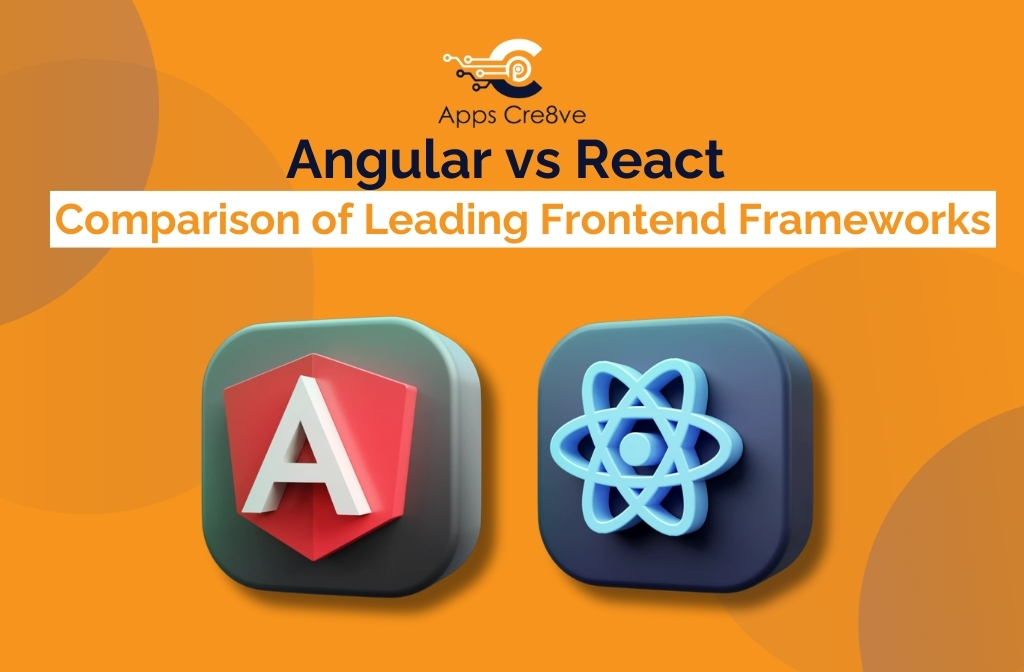Angular vs React Comparison of Leading Frontend Frameworks
1/23/2025

The discussion of Angular vs React is a subject that angers developers and business organizations in the front-end development. Even though both are highly efficient tools for the development of web apps that are dynamic and adaptive. Let’s examine the main distinctions and determine which one best suits your objectives.
A Deep Dive into Angular Vs React
Google created and maintains the extensive, open-source Angular JavaScript framework. Angular offers an entire toolkit for building single-page applications (SPAs) and excels in creating big enterprise-level software. Numerous features are integrated from the start, such as forms processing, state management, and routing.
Facebook developed the JavaScript library React with the goal of creating user interfaces. React is excellent at employing reusable components to create dynamic, highly interactive user experiences. Despite being a user interface library React enables development on both web and mobile applications through its extensive collection of connected tools and libraries. With React Native app development company, developers can use React to create cross platform apps for iOS and Android.
Key Differences Between Angular vs React
Framework vs Library: Flexibility vs Structure
The most important element that separates the two : Angular vs React is Angular being a full fledged framework and primarily a UI Library through React is.
Angular: The framework includes handling forms in addition to state management and routing without requiring separate components. Its structured design works well with teams that develop large-scale applications.
React: The system offers easy customization and handles only user interface tasks for applications. Developers have freedom to choose external tools for their routing needs and state management technology. React brings a minimal set of tools and is a lightweight option that is perfect for applications requiring customization and cross-platform app development.
Performance: Virtual DOM vs Real DOM
Angular works with a Real DOM (Document Object Model) that takes longer because it rebuilds the full DOM every time changes happen. Angular, on the other hand, optimizes efficiency with sophisticated methods like Change Detection and Ahead-of-Time (AOT) compilation. and Change.
React is quicker and more effective for applications that require frequent updates because it employs a Virtual DOM, which enables it to update only the UI elements that change.
Learning Curve: Which One Is Easier to Learn?
Angular asks for TypeScript (default language) with its very own syntax, directives, and on the other side very advanced coding features like the dependency injection which a developer has to learn to be able to develop any Angular web project. This makes the steeper learning curve, but once you have grasped it, the way Angular structures its app is quite manageable for big teams.
React’s emphasis on reusable components and JSX syntax—a combination of HTML and JavaScript—make it easier to master. It is React that is preferred by mobile app developers in Florida that are just starting out or by the ones who are looking to develop their interfaces or applications with React Native to be used natively on both Android and iOS.
Angular vs React: Which One is Better for Mobile App Development?
Angular: Angular is mainly used for developing web apps, but it can also be used to make mobile apps using frameworks like Ionic by Appscre8ve one of leading & trusted app development company west palm beach. When it comes to Angular vs React in mobile programming, Angular has a higher learning curve than React.
React: Building cross-platform apps for iOS and Android with the same codebase is made easy with React’s React Native. React is perfect for developers wishing to construct cross-platform mobile apps because of its robust ecosystem and ease of use.
Ecosystem and Tools: Angular vs React
Angular: RxJS for asynchronous programming, Angular Material for user interface elements, and Angular CLI are all included in the comprehensive framework Angular. This implies that developers can use the Angular ecosystem for nearly anything.
React: React has a modular ecosystem. Developers are free to choose the best tools for their needs, even if React Router and Redux are well-known third-party libraries for managing state and routing.
Comparison Table: Angular vs React Ecosystem
| Feature | Angular | React |
| Type | Full Framework | UI Library |
| Language | TypeScript | JavaScript (with JSX) |
| Routing | Built-in | React Router (third-party) |
| State Management | Built-in (NgRx) | Redux/Context API (third-party) |
| Mobile Development | Ionic/Angular for Mobile | React Native |
Which Framework Should You Choose?
For Enterprise-Level Applications
Angular’s integrated tools, structure, and high maintainability make it perfect for creating enterprise-level, large-scale apps. In Angular vs React, Teams working with large systems and many members find Angular their best solution.
For Speed, Flexibility, and Cross-Platform Mobile Apps
When it comes to Angular vs React, People choose React over other options because it offers quick development time while letting them build web and mobile apps with React Native. The simple design and modular method of React work best when you need unique workflows and fast delivery timelines.
Bottom Line: Angular vs React in 2025
In the realm of frontend frameworks, Angular vs React are both strong candidates, each with special advantages. The decision between the two is based on the complexity of your application, team size, and project goals:
Angular offers the framework and resources required for For Software App Developers West Palm Beach working on enterprise-level projects.
React (with React Native) provides scalability and flexibility for developing dynamic, interactive user interfaces and Cross-Platform App Development.